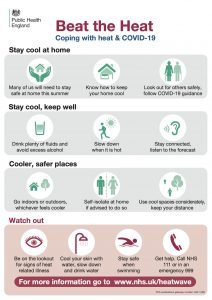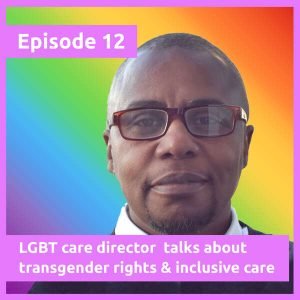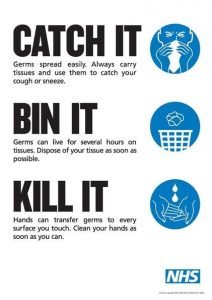Although most of us welcome the summer sun, high temperatures can be harmful to your health. The heat can affect anyone, but some people run a greater risk of serious harm. Many of those who are at risk of harm from heat are also at greater risk of severe illness due to COVID-19 and may need to spend more time at home than they would usually. Others may need to stay at home because they are self-isolating or recovering from the infection.
During the COVID-19 pandemic, its especially important that you know what actions to take to keep yourself and others safe from high temperatures.

This article tells you how to stay safe in hot weather, including how to keep your home cool. In preparation for warmer weather, use our simple checklist to find out if your home is at risk of overheating and find out what you can do if there is a problem. You can download the checklist from the PHE heatwave webpage https://www.gov.uk/government/publications/heatwave-plan-for-england
- Shade or cover windows exposed to direct sunlight, external shutters or shades are very effective, while internal blinds or curtains are less effective but cheaper.
- Do not store alcohol hand sanitiser in direct sunlight
- Metallic blinds and dark curtains can make a room hotter.
- Open windows when the air feels cooler outside than inside, for example, at night. Try to get air flowing through your home, if possible.
- Turn off the central heating, and lights and electrical equipment that aren’t in use.
- Use electric fans if the temperature is below 35°C, but do not aim the fan directly at the body and ensure you stay hydrated with regular drinks.
- Do not use a fan if anyone in the home is unwell with symptoms of coronavirus (COVID-19).
- Check that fridges and freezers are working properly.
If you have concerns about an uncomfortably hot home that is affecting your health or someone else’s health, seek medical advice.
You may be able to get help from the environmental health department within your local authority; they can do a home hazard assessment.
Drink plenty of fluids and avoid excess alcohol
Fluid requirements are higher than normal in hot weather and after strenuous activity, to replace fluids lost through sweating
Everyone is at risk of dehydration in hot temperatures, but babies, children and the elderly are particularly vulnerable.
Keeping hydrated will be especially important for people who are unwell with coronavirus (COVID-19) infection and managing their symptoms at home.
Those who have been unwell with coronavirus (COVID-19) and are recovering, particularly those who have been discharged from hospital, are likely to be more vulnerable to risks from heat stress and dehydration due to complications, for example, damage to their kidneys.
Look out for signs of dehydration such as increased thirst, a dry mouth, dark urine, and urinating infrequently or small amounts. Serious dehydration needs urgent medical attention, more information is available at: https://www.nhs.uk/conditions/dehydration.
Drink plenty of fluids: water, lower fat milks and tea and coffee are good options.
Fruit juice, smoothies and soft drinks do count towards your fluid intake, but can be high in sugar. Limit fruit juice or smoothies to a combined total of 150ml a day and swap sugary soft drinks for diet, sugar-free or no added sugar varieties.

Slow down when it is hot
Heavy activity can make you prone to heat related illnesses, even if you are fit and healthy.
What can I do?
Avoid extreme physical exertion. If you can’t avoid strenuous outdoor activity, such as sport, DIY or gardening, keep it for cooler parts of the day – for example, in the early morning or evening.
Children should not take part in vigorous physical activity on very hot days, such as when temperatures are above 30°C.
More of us are walking and cycling to support social distancing measures on the transport system; listen to the forecast and take it easy if the weather is hot, especially if you are travelling in the hottest part of the day.
Please follow and like us:










